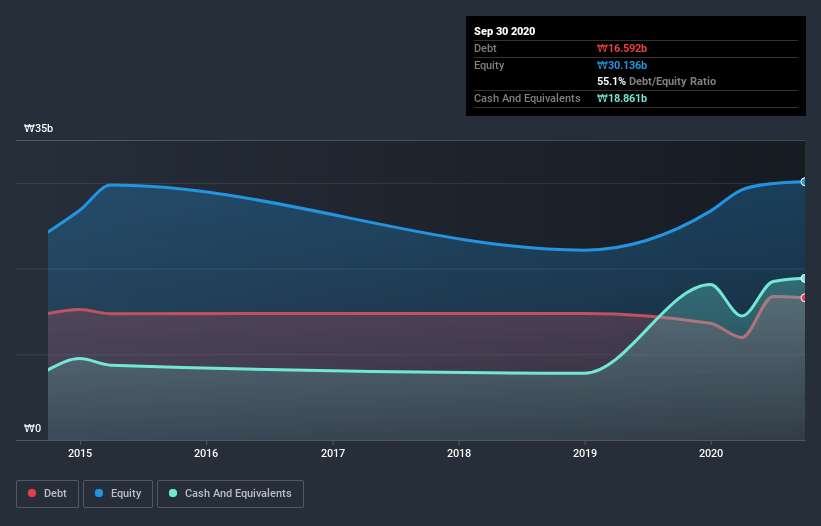- South Korea
- /
- Semiconductors
- /
- KOSDAQ:A089790
Here's Why JT (KOSDAQ:089790) Can Manage Its Debt Responsibly
Legendary fund manager Li Lu (who Charlie Munger backed) once said, 'The biggest investment risk is not the volatility of prices, but whether you will suffer a permanent loss of capital.' So it seems the smart money knows that debt - which is usually involved in bankruptcies - is a very important factor, when you assess how risky a company is. As with many other companies JT Corporation (KOSDAQ:089790) makes use of debt. But the real question is whether this debt is making the company risky.
Why Does Debt Bring Risk?
Debt assists a business until the business has trouble paying it off, either with new capital or with free cash flow. Part and parcel of capitalism is the process of 'creative destruction' where failed businesses are mercilessly liquidated by their bankers. However, a more common (but still painful) scenario is that it has to raise new equity capital at a low price, thus permanently diluting shareholders. Of course, plenty of companies use debt to fund growth, without any negative consequences. The first thing to do when considering how much debt a business uses is to look at its cash and debt together.
View our latest analysis for JT
What Is JT's Net Debt?
As you can see below, at the end of September 2020, JT had ₩16.6b of debt, up from ₩13.6b a year ago. Click the image for more detail. But on the other hand it also has ₩18.9b in cash, leading to a ₩2.27b net cash position.

A Look At JT's Liabilities
The latest balance sheet data shows that JT had liabilities of ₩17.3b due within a year, and liabilities of ₩6.90b falling due after that. On the other hand, it had cash of ₩18.9b and ₩11.0b worth of receivables due within a year. So it actually has ₩5.63b more liquid assets than total liabilities.
This surplus suggests that JT has a conservative balance sheet, and could probably eliminate its debt without much difficulty. Simply put, the fact that JT has more cash than debt is arguably a good indication that it can manage its debt safely.
The modesty of its debt load may become crucial for JT if management cannot prevent a repeat of the 22% cut to EBIT over the last year. Falling earnings (if the trend continues) could eventually make even modest debt quite risky. When analysing debt levels, the balance sheet is the obvious place to start. But you can't view debt in total isolation; since JT will need earnings to service that debt. So if you're keen to discover more about its earnings, it might be worth checking out this graph of its long term earnings trend.
But our final consideration is also important, because a company cannot pay debt with paper profits; it needs cold hard cash. While JT has net cash on its balance sheet, it's still worth taking a look at its ability to convert earnings before interest and tax (EBIT) to free cash flow, to help us understand how quickly it is building (or eroding) that cash balance. Over the most recent three years, JT recorded free cash flow worth 72% of its EBIT, which is around normal, given free cash flow excludes interest and tax. This cold hard cash means it can reduce its debt when it wants to.
Summing up
While it is always sensible to investigate a company's debt, in this case JT has ₩2.27b in net cash and a decent-looking balance sheet. And it impressed us with free cash flow of ₩3.0b, being 72% of its EBIT. So we don't have any problem with JT's use of debt. The balance sheet is clearly the area to focus on when you are analysing debt. But ultimately, every company can contain risks that exist outside of the balance sheet. To that end, you should learn about the 2 warning signs we've spotted with JT (including 1 which is concerning) .
Of course, if you're the type of investor who prefers buying stocks without the burden of debt, then don't hesitate to discover our exclusive list of net cash growth stocks, today.
If you’re looking to trade JT, open an account with the lowest-cost* platform trusted by professionals, Interactive Brokers. Their clients from over 200 countries and territories trade stocks, options, futures, forex, bonds and funds worldwide from a single integrated account. Promoted
New: Manage All Your Stock Portfolios in One Place
We've created the ultimate portfolio companion for stock investors, and it's free.
• Connect an unlimited number of Portfolios and see your total in one currency
• Be alerted to new Warning Signs or Risks via email or mobile
• Track the Fair Value of your stocks
This article by Simply Wall St is general in nature. It does not constitute a recommendation to buy or sell any stock, and does not take account of your objectives, or your financial situation. We aim to bring you long-term focused analysis driven by fundamental data. Note that our analysis may not factor in the latest price-sensitive company announcements or qualitative material. Simply Wall St has no position in any stocks mentioned.
*Interactive Brokers Rated Lowest Cost Broker by StockBrokers.com Annual Online Review 2020
Have feedback on this article? Concerned about the content? Get in touch with us directly. Alternatively, email editorial-team (at) simplywallst.com.
About KOSDAQ:A089790
JT
Engages in the research, development, and sale of semiconductor process and automation equipment in South Korea and internationally.
Adequate balance sheet with low risk.
Market Insights
Community Narratives



